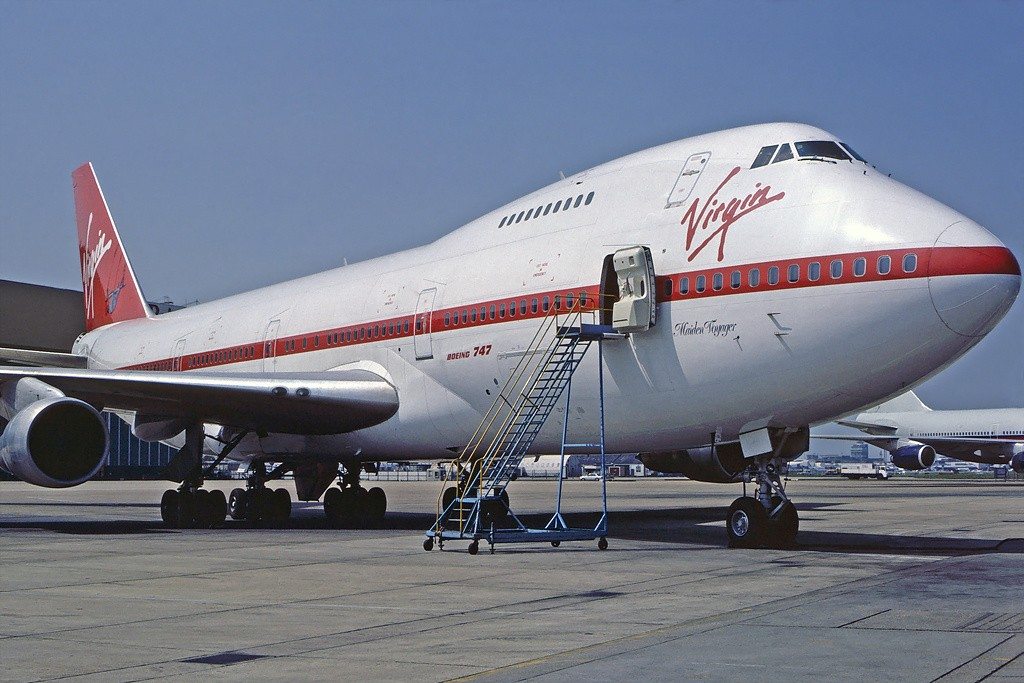In the early 1990s, England’s flagship carrier, British Airways, attempted to orchestrate one of the most heinous PR scandals in air travel history: the ‘Dirty Tricks’ campaign, which targeted Virgin Atlantic.
This covert operation, driven by competitive paranoia and unethical tactics, aimed to undermine Virgin’s growth. This plan, however, backfired spectacularly, costing BA millions and cementing Virgin’s underdog status. Here’s the story of the ‘Dirty Tricks’ campaign.
A ‘Virgin’ in the Airline Industry
In the early 1980s, entrepreneur Sir Richard Branson founded Virgin Atlantic during a ‘boom time’ in the UK, where the average customer had much more wealth to their name, allowing them to afford flights. Virgin’s first flight was on 22 June 1984 on a Boeing 747-200 from London Gatwick (LGW) to Newark (EWR).
The airline quickly won over many travelers, which looked ominous for British Airways’ (BA) market share, thanks to Virgin being among the first airlines to offer in-flight entertainment and Branson’s eccentric personality.
Recently privatized and compelled to keep its position in European air travel, BA saw Virgin not as a minor nuisance but as a major player set out to affect BA’s bottom line. This competition set the stage for a campaign that would unravel into a public relations nightmare.

Behind closed doors, BA started ‘Dirty Tricks,’ also known as ‘Operation Covert Garden,’ in the Summer of 1990. British Airways tried to gain intel from Virgin by having its employees work with or for the newer airline, dressing as Virgin employees to gain access to its headquarters. BA employees allegedly hacked into Virgin’s computer servers to obtain information about passengers and bookings.
Impersonating Virgin, BA would then call or write to these customers to tell them their flights had been canceled and urge them to rebook with BA. BA also spread rumors about Virgin’s financials to the media, painting the airline as an untrustworthy airline and Branson as an erratic showman.
This plan was hatched by BA executives, with the airline’s marketing and sales teams also involved. Only a select few knew of the scheme’s full scope.
Virgin Fires Back at BA
Virgin and Branson eventually discovered Operation Covert Garden in 1991 after receiving suspicious customer complaints. Branson also received intel from BA whistleblowers outside but learned about several instances of BA personnel attempting to undermine Virgin.

Branson wrote an open letter to Virgin accusing them of ‘sharp business practices.’ BA executives dismissed his accusations, stating Branson was just looking for more attention. He later shared his evidence with investigating journalists.
In 1992, Thames Television’s This Week aired a documentary called Dirty Tricks, which exposed BA’s plan to sabotage Virgin to the public for the first time. Following the broadcast, Virgin filed a lawsuit against BA for libel, unfair competition, and corporate espionage.
British Airways Tried to Pivot
In January 1993, BA settled the lawsuit with Virgin. BA paid Branson, Virgin, and courts of up to £3,000,000. Altogether, BA lost $4.8 million ($10.8 million in 2025) from Operation Covert Garden. At the time, this was the largest libel payout in England’s history. Branson used the payout to expand the airline and award his employees.
British Airways issued a formal apology for the scheme. Chairman Lord John King admitted the scheme was ‘regrettable,’ but the damage was done, and the airline’s public trust and goodwill also went to Virgin. King stepped down from his position in June 1993 but remained president emeritus.
‘I’m not so sure they shouldn’t be put behind bars here,’ Branson told the Independent.
A former BA customer service specialist also revealed that BA targeted Dan Air and Europe Air.
The two airlines have moved on from the fiasco but remain fierce competitors to this day. Both offer the same routes from London-Heathrow Airport (LHR) and transatlantic flights to and from North America.
British Airways currently has over 200 global destinations spanning six continents. BA operates at least 12 flights daily between London and New York City. Virgin remains the smaller of the two airlines at only 32 global destinations, with Delta Air Lines owning a 49% stake in the airline today.
